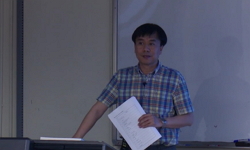이 논문은 윌리암 브레데의 해석학적 개념과 원리들을 그와 동시대의 학문적 분위기의 배경에서 읽고 그의 공헌과 한계들을 비평적으로 검토하는데 있다. 브레데의 해석학은 종교사학파를 ...
http://chineseinput.net/에서 pinyin(병음)방식으로 중국어를 변환할 수 있습니다.
변환된 중국어를 복사하여 사용하시면 됩니다.
- 中文 을 입력하시려면 zhongwen을 입력하시고 space를누르시면됩니다.
- 北京 을 입력하시려면 beijing을 입력하시고 space를 누르시면 됩니다.
https://www.riss.kr/link?id=A82615902
- 저자
- 발행기관
- 학술지명
- 권호사항
-
발행연도
2011
-
작성언어
-
- 주제어
-
KDC
231
-
등재정보
KCI등재후보
-
자료형태
학술저널
-
수록면
181-213(33쪽)
-
KCI 피인용횟수
1
- 제공처
-
0
상세조회 -
0
다운로드
부가정보
국문 초록 (Abstract)
그의 신약신학 연구의 과제를 잘 표현해준 작품이 바로“메시야적 비밀”이라는 그의 마가복음 해석서이다. 브레데에 따르면, 예수는 자신을 한 번도 메시야로 이야기한 적이 없는데, 예수를 메시야로 생각했던 교회가 만들어낸 것이 소위“메시야 비밀”이라는 것이다. 철저하게 역사적인 연구를 통해서 브레데는 교리로부터 해방된 새로운 역사적 신약신학의 연구 방법론을 제시하려고 노력했다.
우리는 브레데의 해석학에서 성경 텍스트의 인간적인 요소에 대한 그의 강조점을 조심스럽게 평가해볼 수 있을 것이다. 브레데는 성경의 인간적인 요소 만을 강조하고 있기 때문에, 그의 성경이해는 필연적으로 성경에 대한 왜곡을 수반할 수 밖에 없다. 달리 표현해서, 성경의 인간적인 요소를 의도적으로 집중하겠다는 것과 그것 만이 성경 해석의 주제라고 이야기하는 것은 완전히 다른 것이다. 성경에 대한 인간적인 요소에 대한 강조는 반드시 성경의 신적인 요소의 빛 아래서 통제되어야 한다. 이러한 상황 속에서 역사적으로 또한 사회적으로 특징 지워진 성경의 인간적인 요소가 더욱 의미 있게 빛을 발할 수 있다. 개혁주의는 신약성경의 신적인 요소와 인간적인 요소를 둘 다 강조하고 있기 때문에, 신적인 요소를 인정하면서 인간적 측면에 대한 연구를 시도하는 것은 역사와 문화에 의해서 특징 지워진 신약성경 연구에 균형잡인 견해를 제공해 줄 수 있다.
이 논문은 윌리암 브레데의 해석학적 개념과 원리들을 그와 동시대의 학문적 분위기의 배경에서 읽고 그의 공헌과 한계들을 비평적으로 검토하는데 있다. 브레데의 해석학은 종교사학파를 배경으로 해서 읽어야 한다. 종교사학파의 주된 특징은 원시 기독교회의 발전을 당시 1세기 종교라는 큰 틀에서 읽어야 한다는 것이다. 이러한 주장 가운데, 브레데는 정경문서라고 하는 것을 인정하기를 거부한다. 초기 기독교 사상 연구의 방법과 과제를 논하면서, 브레데는 신약신학의 연구가 필연적으로 정경적 개념과 권위를 넘어서서 순전히 역사적 연구가 되야함을 강조한다.
그의 신약신학 연구의 과제를 잘 표현해준 작품이 바로“메시야적 비밀”이라는 그의 마가복음 해석서이다. 브레데에 따르면, 예수는 자신을 한 번도 메시야로 이야기한 적이 없는데, 예수를 메시야로 생각했던 교회가 만들어낸 것이 소위“메시야 비밀”이라는 것이다. 철저하게 역사적인 연구를 통해서 브레데는 교리로부터 해방된 새로운 역사적 신약신학의 연구 방법론을 제시하려고 노력했다.
우리는 브레데의 해석학에서 성경 텍스트의 인간적인 요소에 대한 그의 강조점을 조심스럽게 평가해볼 수 있을 것이다. 브레데는 성경의 인간적인 요소 만을 강조하고 있기 때문에, 그의 성경이해는 필연적으로 성경에 대한 왜곡을 수반할 수 밖에 없다. 달리 표현해서, 성경의 인간적인 요소를 의도적으로 집중하겠다는 것과 그것 만이 성경 해석의 주제라고 이야기하는 것은 완전히 다른 것이다. 성경에 대한 인간적인 요소에 대한 강조는 반드시 성경의 신적인 요소의 빛 아래서 통제되어야 한다. 이러한 상황 속에서 역사적으로 또한 사회적으로 특징 지워진 성경의 인간적인 요소가 더욱 의미 있게 빛을 발할 수 있다. 개혁주의는 신약성경의 신적인 요소와 인간적인 요소를 둘 다 강조하고 있기 때문에, 신적인 요소를 인정하면서 인간적 측면에 대한 연구를 시도하는 것은 역사와 문화에 의해서 특징 지워진 신약성경 연구에 균형잡인 견해를 제공해 줄 수 있다.
다국어 초록 (Multilingual Abstract)
Based on his hermeneutical presupposition and his own hermeneutical program on New Testament theology, Wrede wrote a book on Mark’s Gospel entitled Das Messiasgeheimnis (The Messianic Secret). In seeking to explain Mark’s presentation of Jesus’ reticence about his messiahship, his commands either of various people to silence about his miracles or of his disciples about his messiahship, Wrede argues that the whole thing was a clever fabrication by the author of Mark (and the early church) designed to mask the fact that Jesus never actually claimed to be the Messiah at all. By applying his drastic historical-critical method, Wrede tried to show us another direction for the study of New Testament theology. In doing so, he emphasized the importance of historical study for the Scripture and consequently opened up an avenue to the exploration of religions and early Christian documents for the better understanding of the Scripture.
We need to consider the possible positive aspects of Wrede’s emphasis on the humanness of the biblical texts with caution. Since Wrede exclusively emphasizes the humanness of the Bible, his understanding of the Scriptures necessarily entails distortion of it. In other words, to focus on a human side of the biblical texts from the standpoint of view is one thing and to say that it only matters is another. These two are totally different. The former could be a multiperspectival approach and the latter is supposed to necessitate distorting proper biblical understanding. We cannot ignore the humanness of the biblical texts. However, this humanness must be understood in the light and guidance of divineness of the Bible. Under this condition true humanness of biblical texts is properly conceived.
With this kind of caution in mind, we can think of some insights into the historically and socially conditioned character of biblical texts. Since the New Testament is a genuine work of both human and divine author, our intentional focus on human side could be multi-perspectival. This multi-perspectival approach can provide a window into the biblical authors’ use of both culture and language common to their contemporaries. Since the Scripture was written by human authors, sensitivity to the historical and social concerns is both necessary and beneficial for the better understanding of the Scripture.
This paper aims to scrutinize Wrede’s hermeneutical concerns and principles in his own hermeneutical milieu and to evaluate his contributions and limitations. I suggest that the hermeneutics of Wrede should be understood as an outcome of the hermene...
This paper aims to scrutinize Wrede’s hermeneutical concerns and principles in his own hermeneutical milieu and to evaluate his contributions and limitations. I suggest that the hermeneutics of Wrede should be understood as an outcome of the hermeneutical milieu, the History-of-Religions School. The main characteristic of the History-of-Religions School was to interpret primitive Christianity within the framework of the religions of the time. In doing so, Wrede claims that there is no historical justification for distinguishing a ‘canon’ of Scripture from other early Christian writings. In discussing the task and methods of the historical study of early Christian thought, Wrede argues New Testament theology “must be considered and done as a purely historical discipline.”
Based on his hermeneutical presupposition and his own hermeneutical program on New Testament theology, Wrede wrote a book on Mark’s Gospel entitled Das Messiasgeheimnis (The Messianic Secret). In seeking to explain Mark’s presentation of Jesus’ reticence about his messiahship, his commands either of various people to silence about his miracles or of his disciples about his messiahship, Wrede argues that the whole thing was a clever fabrication by the author of Mark (and the early church) designed to mask the fact that Jesus never actually claimed to be the Messiah at all. By applying his drastic historical-critical method, Wrede tried to show us another direction for the study of New Testament theology. In doing so, he emphasized the importance of historical study for the Scripture and consequently opened up an avenue to the exploration of religions and early Christian documents for the better understanding of the Scripture.
We need to consider the possible positive aspects of Wrede’s emphasis on the humanness of the biblical texts with caution. Since Wrede exclusively emphasizes the humanness of the Bible, his understanding of the Scriptures necessarily entails distortion of it. In other words, to focus on a human side of the biblical texts from the standpoint of view is one thing and to say that it only matters is another. These two are totally different. The former could be a multiperspectival approach and the latter is supposed to necessitate distorting proper biblical understanding. We cannot ignore the humanness of the biblical texts. However, this humanness must be understood in the light and guidance of divineness of the Bible. Under this condition true humanness of biblical texts is properly conceived.
With this kind of caution in mind, we can think of some insights into the historically and socially conditioned character of biblical texts. Since the New Testament is a genuine work of both human and divine author, our intentional focus on human side could be multi-perspectival. This multi-perspectival approach can provide a window into the biblical authors’ use of both culture and language common to their contemporaries. Since the Scripture was written by human authors, sensitivity to the historical and social concerns is both necessary and beneficial for the better understanding of the Scripture.
목차 (Table of Contents)
- 1 Introduction
- 2 Wrede’s Hermeneutical Presupposition and Method
- 3 Evaluation
- 4 Conclusion
- 참고문헌
- 1 Introduction
- 2 Wrede’s Hermeneutical Presupposition and Method
- 3 Evaluation
- 4 Conclusion
- 참고문헌
- 영문초록
- 국문초록
참고문헌 (Reference)
1 Schlatter, Adolf, "“The Theology of the New Testament and Dogmatics.” In The Nature of New Testament Theology" SCM Press 1973
2 Wrede, William, "“The Task and Methods of ‘New Testament Theology.’” in The Nature of New Testament Theology" SCM Press 1973
3 Stendahl, Krister, "“Biblical Theology, Contemporary.” In The Interpreter’s Dictionary of the Bible. Vol. 1, 4 vols" Abingdon Press 1962
4 Wrede, William, "The Origin of the New Testament" Harper & Brothers 1909
5 Morgan, Robert, "The Nature of New Testament Theology: Contribution of William Wrede and Adlof Schlatter" SCM Press 1973
6 Neibuhr, Reinhold, "The Nature and Destiny of Man" Charles Scribner's Sons 1941
7 Tuckett, C. M., "The Messianic Secret.” In The Anchor Bible Dictionary. Vol. 5, 8 vols" Doubleday 1997
8 Wrede, William, "The Messianic Secret" J. Clarke 1971
9 Wilson, John, "The Encyclopedia of Religion" Macmillan Publishing Company 1987
10 Harvey, David, "The Condition of Postmodernity" Basil Blackwell 1909
1 Schlatter, Adolf, "“The Theology of the New Testament and Dogmatics.” In The Nature of New Testament Theology" SCM Press 1973
2 Wrede, William, "“The Task and Methods of ‘New Testament Theology.’” in The Nature of New Testament Theology" SCM Press 1973
3 Stendahl, Krister, "“Biblical Theology, Contemporary.” In The Interpreter’s Dictionary of the Bible. Vol. 1, 4 vols" Abingdon Press 1962
4 Wrede, William, "The Origin of the New Testament" Harper & Brothers 1909
5 Morgan, Robert, "The Nature of New Testament Theology: Contribution of William Wrede and Adlof Schlatter" SCM Press 1973
6 Neibuhr, Reinhold, "The Nature and Destiny of Man" Charles Scribner's Sons 1941
7 Tuckett, C. M., "The Messianic Secret.” In The Anchor Bible Dictionary. Vol. 5, 8 vols" Doubleday 1997
8 Wrede, William, "The Messianic Secret" J. Clarke 1971
9 Wilson, John, "The Encyclopedia of Religion" Macmillan Publishing Company 1987
10 Harvey, David, "The Condition of Postmodernity" Basil Blackwell 1909
11 Hasel, Gerhard, "New Testament Theology: Basic Issues in the Current Debate" Eerdmans 1978
12 Birch, Bruce, "Let Justice Roll Down: The Old Testament, Ethics, and Christian Life" Westminster / John Knox Press 1991
13 Kraus, H. J., "Die Biblische Theologie: Ihre Geschichte und Problematik" Vluyn 1970
14 Borgman, Albert, "Crossing the Postmodern Divide" University of Chicago Press 1992
15 Räisänen, Heikki, "Beyond New Testament Theology" Trinity Press International 1990
동일학술지(권/호) 다른 논문
-
Theology and Practice of Calvin’s Eucharistic Rite in Geneva
- 개혁신학회
- 주종훈(Joo, Jong-Hun)
- 2011
- KCI등재후보
-
Chronological Harmonization between the Two Creation Accounts in Genesis
- 한국개혁신학회
- 황선우(Hwang, Sun-Woo)
- 2011
- KCI등재후보
-
은혜의 수단인 기도로서의 시편 찬송에 대한 칼빈의 이해
- 개혁신학회
- 이은선(Lee, Eun-Seon)
- 2011
- KCI등재후보
-
- 개혁신학회
- 성호숙(Sung, Ho-Sook)
- 2011
- KCI등재후보
분석정보
인용정보 인용지수 설명보기
학술지 이력
| 연월일 | 이력구분 | 이력상세 | 등재구분 |
|---|---|---|---|
| 2024 | 평가예정 | 계속평가 신청대상 (계속평가) | |
| 2022-01-01 | 평가 | 등재후보학술지 선정 (신규평가) |  |
| 2021-12-01 | 평가 | 등재후보 탈락 (계속평가) | |
| 2019-01-01 | 평가 | 등재후보학술지 선정 (신규평가) |  |
| 2018-12-01 | 평가 | 등재후보 탈락 (계속평가) | |
| 2016-01-01 | 평가 | 등재후보학술지 선정 (신규평가) |  |
| 2015-12-01 | 평가 | 등재후보 탈락 (기타) | |
| 2014-01-08 | 학회명변경 | 한글명 : 개혁신학회 -> 영문명 : 미등록 -> The Society of Reformed Theology |  |
| 2014-01-08 | 학술지명변경 | 외국어명 : 미등록 -> Korea Reformed Journal |  |
| 2013-01-01 | 평가 | 등재후보학술지 유지 (등재후보2차) |  |
| 2012-01-01 | 평가 | 등재후보 1차 PASS (등재후보1차) |  |
| 2011-01-01 | 평가 | 등재후보학술지 유지 (등재후보1차) |  |
| 2010-01-01 | 평가 | 등재후보 1차 FAIL (등재후보2차) |  |
| 2009-01-01 | 평가 | 등재후보 1차 PASS (등재후보1차) |  |
| 2007-01-01 | 평가 | 등재후보학술지 선정 (신규평가) |  |
학술지 인용정보
| 기준연도 | WOS-KCI 통합IF(2년) | KCIF(2년) | KCIF(3년) |
|---|---|---|---|
| 2016 | 0.44 | 0.44 | 0.43 |
| KCIF(4년) | KCIF(5년) | 중심성지수(3년) | 즉시성지수 |
| 0.38 | 0.38 | 0.59 | 0.13 |





 스콜라
스콜라






